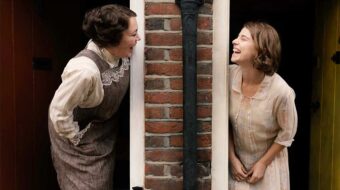
When it comes to television, adaptations of graphic novels are risky business. When AMC picked up “The Walking Dead,” however, it was a risk worth taking. The horror-drama series has captivated audiences and offered surprisingly deep looks into human nature. And yes, there are lots and lots of zombies.
The story centers on a group of survivors in post-apocalyptic America, trying to live a life with meaning while constantly fighting with or running from the living dead. The main character is a former police sheriff named Rick (Andrew Lincoln), joined by his wife and son.
The series takes concepts like morality, ethics, and what it means to be a human being, and juxtaposes each of them in turn with a chaotic, grim atmosphere, plagued by millions of zombies.
In addition to staying true to the core of the original graphic novels, “The Walking Dead” also takes on a life of its own, focusing on character building and subplots, not all of which exist in the original source material. In fact, one character – a bucolic, gruff survivalist named Daryl (Norman Reedus) – was created specifically for the show, and quickly became a fan favorite.
Another character, Shane (former best friend of Rick), was, in the opinion of many, an altogether dislikable figure in the comics. His television counterpart, on the other hand, added a layer of humanity to the character’s anger, arrogance, and eventual craziness – more than likely, due to the solid acting of Jon Bernthal, who portrays him.
It was a telling sign of how far the actors have come over the two years the show has been on the air, when, in this past season’s penultimate episode, Shane’s death hit an emotional nerve with audiences, and became one of the most powerful scenes of the series so far.
The Walking Dead is bringing in viewers by the millions; the Season Two finale came just short of nine million views, an unprecedented feat.
So why the popularity? Clearly, there is more to the show than your typical cut-and-paste zombie gore scenes.
The scenes with the undead are interspersed with real drama that explores multiple aspects of the human condition; the first and foremost has seemed to analyze “survival of the fittest vs. solidarity,” with the latter ultimately prevailing.
Despite Shane’s deceptive tactics to pit people against one another (and eventually, to kill his former best friend), Rick manages to keep the group (a coalition that has included African American, Asian American, Latinos, city people, and country people, all with racial and ideological differences set aside) bound tightly together as a close-knit unit
One strong scene this season involved the capture of a teenage prisoner from another – less peaceful – group. Fearing the prisoner would lead his “friends” to them (whereupon it was likely they would pillage and kill Rick and his people), Shane vouched for, in the interest of survival, killing the youth.
After older group member Dale (Jeffrey DeMunn) convinced everyone to reconsider (in a scene that truly decried the death penalty, and lack of concern for other people in general), Rick ultimately decided to show mercy on the teen, and used the opportunity to set an example for his son.
It is for these and other strong moments that many are drawn back in to the show, episode after episode. And these elements separate “The Walking Dead” from the typical zombie story. It’s a pleasant surprise to see that, amidst all the blood and brains, the series has values to fall back on.
Granted, Season Two of the show was initially monotonous; its plot got a bit watered down, and plodded along with all the speed of a turtle (or a zombie itself, perhaps). However, once the pace picked up, viewers were again reminded why they loved the show so much in the first place.
Given that the zombie aesthetic has recently been used for progressive political activism (how many times have the living dead marched against capitalism now?), people ought to have one more incentive to check out “The Walking Dead.”
In conclusion, many might ask, why are the undead such a suitable vehicle for exploring our humanity, and for inciting positive collective action? Perhaps because the monsters represent immobility; apathy; confusion; all of the traits that can be experienced under a right-wing, capitalist stronghold. Or, maybe people just love zombies.
“The Walking Dead” will not only come to be regarded as a huge contribution to the zombie genre – it will come to define it. And if any of the values the show espouses grab you – or if you just love good horror – it’s absolutely worth a watch.
Photo: Andrew Lincoln portrays Rick Grimes in the Season 2 finale of “The Walking Dead.” Gene Page/AMC & AP












Comments